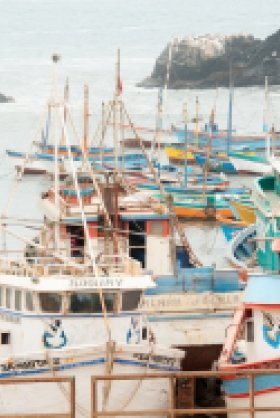Artisanal Squid Fishing in Peru Threatened by International Fleets











To examine the role of the international community in shaping Latin America’s environmental agenda, the Wilson Center’s Latin American Program and its Brazil Institute, Environmental Change and Security Program, China Environment Forum, and Global Europe Program launched a collaborative research project last year, Latin America’s Environmental Policies in Global Perspective. Through a series of papers written by experts representing diverse perspectives, the project explores how environmental challenges in Latin America increasingly condition the region’s most important diplomatic and economic relationships, and how those relationships in turn impact conditions on the ground.
Leslie Moreno Custodio, a journalist and photographer based in Lima, covers social issues concerning the environment, human rights, and indigenous communities throughout the hemisphere. She delves into the growing menace of overfishing in Peru and the role of international actors, primarily from Asia, that have come to exploit vulnerable species for export. She writes in Artisanal Squid Fishing in Peru Threatened by International Fleets: “[…] there has been a steady increase in the Chinese fleet over the past decade. In 2010 there were 104 Chinese vessels; in 2019 there were 503.”


The Wilson Center’s prestigious Latin America Program provides non-partisan expertise to a broad community of decision makers in the United States and Latin America on critical policy issues facing the Hemisphere. The Program provides insightful and actionable research for policymakers, private sector leaders, journalists, and public intellectuals in the United States and Latin America. To bridge the gap between scholarship and policy action, it fosters new inquiry, sponsors high-level public and private meetings among multiple stakeholders, and explores policy options to improve outcomes for citizens throughout the Americas. Drawing on the Wilson Center’s strength as the nation’s key non-partisan policy forum, the Program serves as a trusted source of analysis and a vital point of contact between the worlds of scholarship and action. Read more


The Environmental Change and Security Program (ECSP) explores the connections between environmental change, health, and population dynamics and their links to conflict, human insecurity, and foreign policy. Read more


China’s global footprint isn’t just an economic one, it’s an environmental one. From BRI investments in Africa and Asia to its growing presence in Latin America, understanding China’s motivations, who stands to gain - and who stands to lose - is critical to informing smart US foreign policy. Read more


The Brazil Institute—the only country-specific policy institution focused on Brazil in Washington—aims to deepen understanding of Brazil’s complex landscape and strengthen relations between Brazilian and US institutions across all sectors. Read more


The Global Europe Program is focused on Europe’s capabilities, and how it engages on critical global issues. We investigate European approaches to critical global issues. We examine Europe’s relations with Russia and Eurasia, China and the Indo-Pacific, the Middle East and Africa. Our initiatives include “Ukraine in Europe”—an examination of what it will take to make Ukraine’s European future a reality. But we also examine the role of NATO, the European Union and the OSCE, Europe’s energy security, transatlantic trade disputes, and challenges to democracy. The Global Europe Program’s staff, scholars-in-residence, and Global Fellows participate in seminars, policy study groups, and international conferences to provide analytical recommendations to policy makers and the media. Read more
